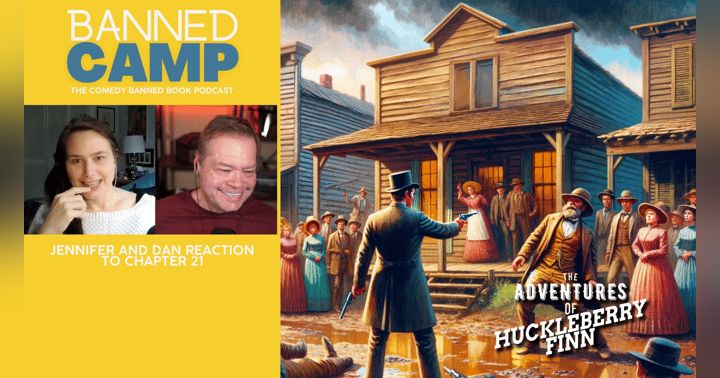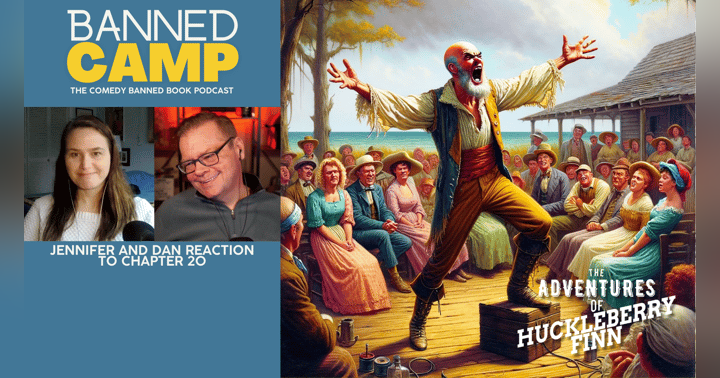Unveiling Huck Finn: The Great Wilks Swindle - Banned Camp

In the latest escapade of "Banned Camp," hosts Jennifer and Dan delved into Chapter 25 of Mark Twain's ever-controversial classic, "The Adventures of Huckleberry Finn." The episode, packed with intrigue and Twain's characteristic wit, is a deep dive into the devious world of the king and the duke. Listen to the episode here.
At Banned Camp, a podcast where laughter meets literature, we're not just reading; we're unraveling the threads of why these literary works were once considered too hot to handle. From "To Kill a Mockingbird" to "Fahrenheit 451," and now "Huckleberry Finn," each episode is a journey through the pages that shook the world. Discover more about Banned Camp.
In this episode, we tackle a chapter where trickery and tears are the orders of the day. The king and the duke, those masters of manipulation, put on a show that would make modern con artists take notes. But it's not just about the con. It's about understanding the societal undercurrents that allow such deceit to thrive, a theme all too relevant in today's world.
What Is In Chapter 25 Of "The Adventures of Huckleberry Finn"?
In Chapter 25 of "The Adventures of Huckleberry Finn," we witness a masterclass in deception. The king and the duke, those notorious tricksters, hoodwink an entire town into believing they are the long-lost brothers of the recently deceased Peter Wilks. Their performance is nothing short of Oscar-worthy, complete with tears and a melodramatic speech that Huck Finn describes as "all full of tears and flapdoodle."
The plot thickens when Peter Wilks' will is revealed, leaving all his possessions to these supposed brothers, alongside a tidy sum of $6,000 in gold. The duke and king, in a stroke of cunning, relinquish their share to Wilks' daughters, further cementing their ruse. But not everyone is fooled; the local doctor smells a rat and tries to warn the daughters, leading to a tense standoff where faith and suspicion collide.
This chapter, teeming with irony and Twain's keen observations of human nature, is a pivotal moment in the novel. It's a window into the ease with which grief can be exploited and trust manipulated. For a deeper dive into the twists and turns of this classic, catch up on all of the Banned Camp Episodes about "The Adventures of Huckleberry Finn" here.
Character Development
Chapter 25 of "The Adventures of Huckleberry Finn" is a showcase of Mark Twain's brilliance in character development. The king and the duke, already established as dubious figures, elevate their craft of deception to new heights, manipulating an entire town's emotions. Their ability to play on the townspeople's sympathies and greed reveals not only their cunning but also the gullibility and superficiality of society.
Meanwhile, Huck, our young protagonist, continues to grapple with his moral compass. Observing the duke and king's antics, he becomes increasingly aware of the complexities of right and wrong. This chapter deepens our understanding of Huck's internal conflict, as he navigates a world riddled with hypocrisy and dishonesty.
Twain also uses the reactions of the minor characters, like the local doctor, to underscore the theme of skepticism versus naivety. The doctor's incredulity contrasts sharply with the daughters' blind trust, highlighting the varied human responses to deceit.
This chapter's rich character tapestry not only propels the story forward but also offers a microcosm of society, where truth and lies dance a delicate tango, leaving the reader to ponder who truly leads.
Themes and Symbols
Chapter 25 of "The Adventures of Huckleberry Finn" is rife with themes and symbols that Mark Twain masterfully weaves into the narrative tapestry. Central to this chapter is the theme of deception and the moral ambiguity surrounding it. The king and duke's con act is a blatant display of deceit, yet it's executed under the guise of familial love and grief, blurring the lines between right and wrong.
Grief and vulnerability are also prominent themes. The townspeople's and the Wilks sisters' vulnerability in the face of loss make them easy targets for the con artists. This exploitation of grief reflects a darker side of human nature and societal norms.
The chapter is also a commentary on trust and gullibility. The ease with which the town accepts the king and duke as the Wilks brothers symbolizes the human tendency to believe what is convenient or comforting, even in the face of glaring inconsistencies.
Moreover, Twain uses irony as a potent tool throughout the chapter. The dramatic irony of the audience knowing the truth about the king and duke, while the characters do not, creates a tension that underscores the absurdity of the situation.
Through these themes and symbols, Twain not only advances the plot but also offers a critique of societal mores and the human condition, making this chapter a critical piece in the puzzle of "Huckleberry Finn."
Chapter's Impact on the Overall Story
Chapter 25 of "The Adventures of Huckleberry Finn" is not just another episode in the adventures of Huck and his companions; it's a pivotal moment that significantly influences the narrative arc of the novel. The chapter's events deepen the thematic exploration of deceit and morality, themes central to Twain's narrative.
The king and duke's successful swindle is a turning point that sets a darker tone for the novel. It highlights the ease with which innocence can be exploited and morality can be muddied. This chapter underscores the novel's exploration of the complexities of human nature and the often blurry line between right and wrong.
Furthermore, Huck's reactions and internal conflict regarding the duke and king's actions foreshadow his growing disillusionment with societal norms and his eventual moral awakening. This chapter, therefore, is crucial in Huck's character development, as he continues to question the ethics and values of the society he inhabits.
Overall, Chapter 25 amplifies the novel's critique of societal hypocrisy and paves the way for the subsequent events that challenge Huck's understanding of justice, fairness, and humanity.
Banning Triggers: Themes from Chapter 25
Chapter 25 of "The Adventures of Huckleberry Finn" presents themes and scenarios that, while provocative, do not, in the opinion of Jennifer and Dan, warrant the book's banning. The chapter's portrayal of deceit and exploitation of vulnerability, particularly in times of grief, could be seen as controversial. The king and duke's antics, while dishonest and morally questionable, serve to highlight societal flaws and human fallibility.
The theme of gullibility in the face of convincing lies could be perceived as a sensitive topic. Twain's depiction of the townspeople's readiness to trust the con men might be seen as a commentary on human nature that some could find unsettling.
Moreover, the frequent use of the term "hairlip" by Twain, as pointed out humorously by Jennifer and Dan, is outdated and could be considered offensive by modern standards. This, along with the comic misuse of the word "orgies," might be points of contention.
However, as Jennifer and Dan recognize, these elements of the chapter, while they may provoke thought and discussion, do not justify banning the book. They serve to enhance Twain's critique of society and human nature, integral to understanding the novel's enduring relevance.
Conclusion
Banned Camp is a comedy podcast where we read banned books and find out why they were banned in the first place. Dive into our banned book podcast to explore more.
Further Reading
Mark Twain: A Life by Ron Powers
A comprehensive biography that explores the life of Mark Twain and the societal context of his works. http://www.penguinrandomhouse.com/books/292624/mark-twain-by-ron-powers/
The Annotated Huckleberry Finn by Michael Patrick Hearn
This annotated version provides detailed insights, historical context, and literary analysis of Twain's classic. http://www.wwnorton.com/books/The-Annotated-Huckleberry-Finn
Racism in Huckleberry Finn: Understanding and Teaching Twain in the Modern Classroom by Dr. Alan Gribben
This book explores the challenges of teaching "Huckleberry Finn" in modern times, focusing on its racial themes.
http://www.teacherscollegepress.com/book/9780807752963










